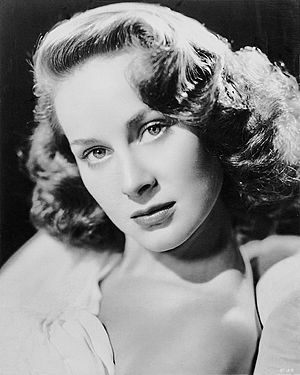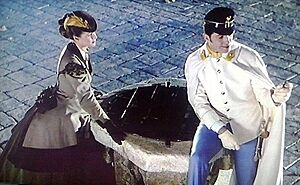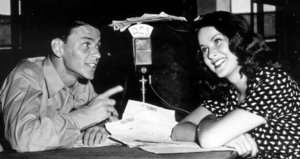Alida Valli facts for kids
Quick facts for kids
Alida Valli
|
|
|---|---|

Valli in 1947
|
|
| Born |
Alida Maria Laura, Freiin Altenburger von Marckenstein-Frauenberg
31 May 1921 Pola, Italy (now Croatia)
|
| Died | 22 April 2006 (aged 84) Rome, Italy
|
| Other names | Valli |
| Occupation | Actress, Singer |
| Years active | 1936–2002 |
| Spouse(s) |
Oscar de Mejo
(m. 1944; div. 1952)Giancarlo Zagni (m. 196?; div. 1970) |
| Children | 2, including Carlo De Mejo |
| Signature | |
Alida Valli (born May 31, 1921 – died April 22, 2006) was a famous Italian actress. She starred in over 100 movies during her long career, which lasted for 70 years. She was a huge star in Italy from the 1930s to the early 2000s.
Some people even called her "the most beautiful woman in the world." She was compared to other legendary actresses like Marlene Dietrich and Greta Garbo. Alida Valli worked with many important film directors from Italy and other countries. These included Alfred Hitchcock, Carol Reed, Luchino Visconti, and Dario Argento.
She received many honors for her work. She was named a Knight of the Italian Republic. She also won the Lifetime Achievement Golden Lion award at the 1997 Venice Film Festival. This award celebrated her amazing contributions to cinema.
Contents
Early Life and Background
Alida Valli was born in Pola, Italy. This city is now called Pula and is in Croatia. Her family had roots from Austria, Slovenia, and Italy. Even with this mixed background, she was always seen as Italian.
Alida grew up speaking many languages. She learned Slovene, Italian, and German. She also became fluent in Serbo-Croatian, French, and English. This skill was very helpful in her international films. She could speak her lines in the language of the other actors. Then, she would often dub her own voice into Italian for the movie's sound.
A Star's Journey: Her Career

When Alida was 15, she moved to Rome. There, she attended a special school for film actors and directors. This school, called Centro Sperimentale di Cinematografia, is one of the oldest and best in Europe.
She started her movie career in 1934. Her first big hit was Mille lire al mese in 1939. She became known for her serious acting roles. In 1941, she won a special award for Best Actress at the Venice Film Festival for her role in Piccolo mondo antico.
During World War II, she made several movies. Two of these, Noi Vivi and Addio Kira!, were based on a book. These films had messages against strict governments, which was very brave at the time.
By her early 20s, Alida Valli was already famous. She went to Hollywood and signed a contract with a big producer, David Selznick. He thought she could be as popular as Ingrid Bergman. In Hollywood, she starred in famous movies like Alfred Hitchcock's The Paradine Case (1947). She also appeared with Orson Welles in The Third Man (1949). This movie is considered one of the best British films ever made.
In America, she was often just called 'Valli'. She didn't like this one-name style. She said it made her feel silly and that people confused her with another famous person, Rudy Vallée. She also found the rules in Hollywood too strict. So, she decided to end her contract and return to Europe.
Back in Europe in the 1950s, she continued to make many French and Italian films. A big success was the drama Senso in 1954. In 1956, she decided to focus more on theater. She even ran a company that produced plays in Italy.

Alida Valli kept working in films through the 1960s and beyond. She appeared in the horror film Eyes Without a Face (1959). She also worked with famous directors like Pier Paolo Pasolini, Bernardo Bertolucci, and Dario Argento. Her very last movie role was in Semana Santa in 2002.
She was also well-known for her stage performances. She acted in plays by famous writers like Henrik Ibsen and Arthur Miller. In 1997, she received the Golden Lion award at the Venice Film Festival for her entire career.
Personal Life
Alida Valli's first love was Carlo Cugnasca, a famous Italian pilot. He was a fighter pilot and sadly died during a mission in 1941.
She married Oscar de Mejo in 1943. They had two sons together. Their marriage ended in 1952, and she moved back to Italy. Later, in the 1960s, she married Italian film director Giancarlo Zagni. They divorced in 1970.
Death and Legacy
Alida Valli passed away at her home in Rome on April 22, 2006.
Many critics praised her talent. One critic, David Shipman, said that if you watch her later films, you would see her as "one of the half-dozen best actresses in the world." Another critic, Frédéric Mitterrand, believed she was the only European actress who could truly compare to stars like Marlene Dietrich and Greta Garbo. Her long career and many memorable roles show her lasting impact on cinema.
Filmography
Film
| Year | Title | Role | Notes |
|---|---|---|---|
| 1935 | The Three-Cornered Hat | Uncredited | |
| 1936 | The Two Sergeants | Una commessa dell'emporio 'Au Bon Marché' | as Alida Altenburger |
| 1937 | It Was I! | Lauretta | |
| The Ferocious Saladin | Dora Florida / La bella Sulamita | ||
| 1938 | A Lady Did It | Maria Sardo | |
| L'amor mio non muore! | Maria D'Alba | ||
| The House of Shame | La ragazza | ||
| 1939 | A Thousand Lire a Month | Magda | |
| Unjustified Absence | Vera Fabbri | ||
| The Castle Ball | Greta Larsen | ||
| 1940 | Manon Lescaut | Manon Lescaut | |
| Red Tavern | Susanna Sormani | ||
| The Last Enemy | A friend of Anna | ||
| Beyond Love | Vanina Vanini | ||
| The First Woman Who Passes | Gabrielle de Vervins | ||
| 1941 | Piccolo mondo antico | Luisa Rigey Maironi | |
| Light in the Darkness | Marina Ferri | ||
| Schoolgirl Diary | Anna Campolmi | ||
| The Secret Lover | Renata Croci | ||
| 1942 | We the Living | Kira Argounova | |
| Invisible Chains | Elena Silvagni | ||
| The Two Orphans | Enrichetta | ||
| Addio Kira | Kira Argounova | ||
| Stasera niente di nuovo | Maria | ||
| 1943 | I pagliacci | Giulia | |
| T'amerò sempre | Adriana | ||
| Apparizione | Andreina | ||
| 1944 | The Za-Bum Circus | segments "Gelosia", "Il postino" and "Galop finale al circo" | |
| 1945 | Il canto della vita | Patrizia Martini | |
| Life Begins Anew | Giovanna | ||
| 1946 | Eugenia Grandet | Eugenia Grandet | |
| 1947 | The Paradine Case | Maddalena Anna Paradine | |
| 1948 | The Miracle of the Bells | Olga | |
| 1949 | The Third Man | Anna Schmidt | |
| 1950 | The White Tower | Carla Alton | |
| Walk Softly, Stranger | Elaine Corelli | ||
| 1951 | Les Miracles n'ont lieu qu'une fois | Claudia | |
| Last Meeting | Lina Castelli | ||
| 1953 | Lovers of Toledo | Doña Inés de Arévalo Blas | |
| The World Condemns Them | Renata Giustini | ||
| We, the Women | Alida | Segment: "Alida Valli" | |
| 1954 | The Stranger's Hand | Roberta Gleukovitch | |
| Senso | La contessa Livia Serpieri | ||
| 1957 | Il Grido | Irma | |
| This Angry Age | Claude | ||
| The Wide Blue Road | Rosetta | ||
| 1958 | The Night Heaven Fell | Florentine | |
| L'amore più bello | Carolina | ||
| 1959 | Signé Arsène Lupin | Aurélia Valéano | |
| 1960 | Treno di Natale | ||
| Eyes Without a Face | Louise | ||
| Dialogue with the Carmelites | Mère Thérèse de Saint-Augustin | ||
| Il peccato degli anni verdi | Elena's mother | ||
| 1961 | The Long Absence | Thérèse Langlois | |
| The Happy Thieves | Duchess Blanca | ||
| La fille du torrent | Livia Boissière | ||
| 1962 | Disorder | Carlo's Mother | |
| Al otro lado de la ciudad | |||
| Homage at Siesta Time | Constance Fischer | ||
| 1963 | A la salida | ||
| Ophelia | Claudia Lesurf | ||
| The Castilian | Reina Teresa | ||
| The Paper Man | La Italiana | ||
| Una cara para escapar | |||
| 1964 | L'Autre Femme | Annabel | |
| 1965 | Black Humor | The Widow | segment: "La vedova" |
| 1967 | Edipo re | Merope | |
| 1970 | The Mushroom | Linda Benson | |
| La strategia del ragno | Draifa | ||
| 1972 | Eye in the Labyrinth | Gerda | |
| La prima notte di quiete | Marcella Abati - Vanina's mother | ||
| 1973 | Lisa and the Devil | Countess | |
| Diario di un italiano | Olga | ||
| 1974 | Lola | Louise | |
| Tender Dracula | Héloïse | ||
| The Antichrist | Irene | ||
| 1975 | La Chair de l'orchidée | La folle de la gare | |
| Cher Victor | Anne | ||
| Il caso Raoul | Elsa | ||
| 1976 | Novecento | Signora Pioppi | |
| Le jeu du solitaire | Germaine | ||
| The Cassandra Crossing | Nanny | ||
| 1977 | Suspiria | Miss Tanner | |
| Un cuore semplice | Mrs. Obin | ||
| Berlinguer, I Love You | Mrs. Cioni | ||
| 1978 | Porco mondo | Teresina | |
| The Perfect Crime | Lady Clementine De Revere | ||
| 1979 | Zoo zéro | Yvonne, la mère | |
| Killer Nun | Mother Superior | ||
| La luna | Giuseppe's Mother | ||
| Licanthropus, il figlio della notte | |||
| 1980 | Inferno | Carol, the caretaker | |
| Aquella casa en las afueras | Isabel | ||
| Puppenspiel mit toten Augen | |||
| 1981 | Peacetime in Paris | ||
| The Fall of the Rebel Angels | Bettina | ||
| 1982 | Aspern | Juliana Bartes | |
| Sogni mostruosamente proibiti | Marina's mother | ||
| 1985 | Secrets Secrets | Gina | |
| 1987 | Le jupon rouge | Bacha | |
| 1988 | À notre regrettable époux | Catarina | |
| 1991 | La bocca | Countess Bianca Rospigliosi | |
| The Party's Over | Clara | ||
| 1993 | The Long Silence | Carla's Mother | |
| Bugie rosse | Caterina, Andrea's mother | ||
| 1995 | A Month by the Lake | Signora Fascioli | |
| 1996 | Fotogrammi mortali | Countess Alessandra Mirafiori | |
| 1999 | Il dolce rumore della vita | Sofia's grandmother | |
| 2000 | Vino santo | Sveva | |
| 2001 | Probably Love | Alida Valli | |
| 2002 | Semana santa | Doña Catalina | Final film role |
Television
- I Figli di Medea (1959) as Medea / Alida Valli
- Il caso Mauritius (1961)
- Combat! as Marie (Episode: "Doughboy", 1963)
- Desencuentro (series, 1964)
- Rome Will Never Leave You, three episodes of Dr. Kildare (1964) as Luisa Brabante
- Il consigliere imperiale (1974)
- Les grandes conjurations: Le tumulte d'Amboise (1978)
- L'altro Simenon (series, 1979)
- L'eredità della priora (serial, 1980) as Priora
- Dramma d'amore (serial, 1983)
- Piccolo mondo antico (serial, 1989) as La marchesa Maironi
- Una vita in gioco 2 (serial, 1992)
- Delitti privati (1992) as Matilde Pierboni
Theatre
- La casa dei Rosmer (1956) Henrik Ibsen (aka Rosmersholm)
- L'uomo, la bestia e la virtù (1956), Luigi Pirandello
- Gli innocenti (1956), William Archibald
- Enrico IV (1958), Luigi Pirandello
- Il sole e la luna (1965), Guglielmo Biraghi
- Epitaffo per George Dillon (1966), John Osborne and Anthony Creighton (Epitaph for George Dillon)
- Uno sguardo dal ponte (1967), Arthur Miller (A View from the Bridge)
- La bambolona (1968), Raf Vallone
- Il dio Kurt (1969), Alberto Moravia
- I parenti terribili (1969), Jean Cocteau (Les parents terribles)
- Uno sporco egoista (1971), Francois Dorin
- Lulu (Lo spirito della terra – Il vaso di Pandora) (1972), Frank Wedekind (Lulu [Erdgeist-Die Büchse der Pandora])
- Le massacre à Paris (1972), Christopher Marlowe (The Massacre at Paris)
- Il Gabbiano (1973), Anton Cechov
- L'uomo che incontrò de stesso (1981), Luigi Antonelli
- La Venexiana (1981), Anonimo del Cinquecento
- La fiaccola sotto il moggio (1981), Gabriele d'Annunzio
- Ekaterina Ivanovna (1983), Leonid Andreev
- Il malinteso (1984), Albert Camus (Le malentendu)
- Romeo e Giulietta (1985), William Shakespeare (Romeo and Juliet)
- A porte chiuse, da Sartre a Mishima (1986), di Jean-Paul Sartre e Yukio Mishima (Huis clos – Aoi – Hanjo)
- La città morta (1988), Gabriele D'Annunzio
- La nave (1988), Gabriele D'Annunzio
- I paraventi (1990), Jean Genet (Les paravents)
- Improvvisamente l'estate scorsa (1991), Tennessee Williams (Suddenly Last Summer)
- Più grandiose dimore (1993), Eugene O'Neill
- Così è (se vi pare) (1994), Luigi Pirandello
- Questa sera si recita a soggetto (1995), Luigi Pirandello
Radio appearances
| Year | Program | Episode/source |
|---|---|---|
| 1948 | Lux Radio Theatre | The Miracle of the Bells |
Lux Radio Theatre broadcast "The Paradine Case" in a radio adaptation of the film on 9 May 1949, starring Joseph Cotten, with Alida Valli and Louis Jourdan reprising their roles.
See also
 In Spanish: Alida Valli para niños
In Spanish: Alida Valli para niños
 | Isaac Myers |
 | D. Hamilton Jackson |
 | A. Philip Randolph |

